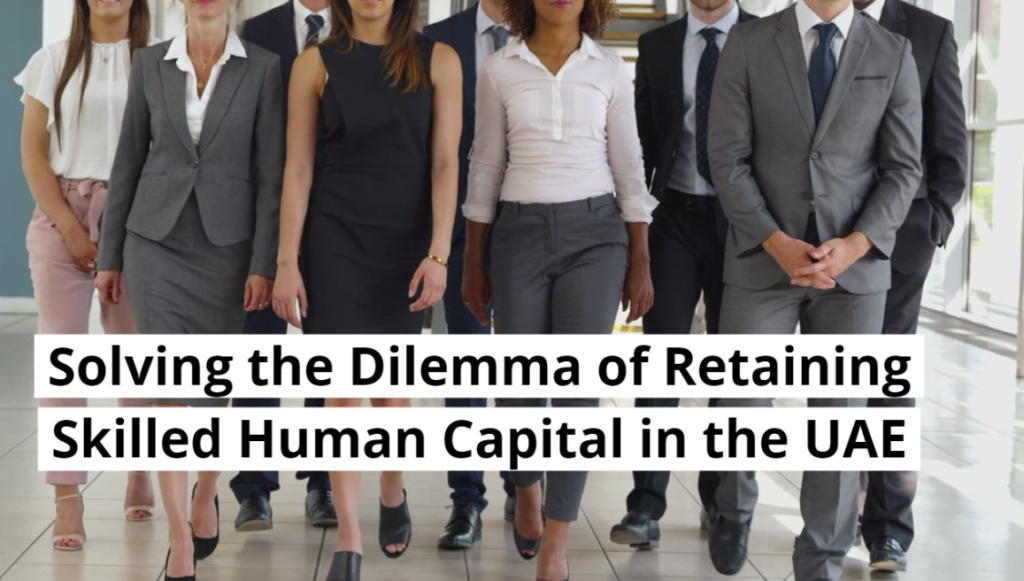More than ever before, human capital is recognised as the one resource that can propel economies to the top tier of competitiveness. A key issue for the UAE is attracting, developing and retaining highly skilled individuals. There is a growing understanding that securing and retaining international talent is crucial to driving innovation and the economic trajectory of the country. The government has introduced a number of measures and policy changes in recent years designed to attract and retain highly skilled international talent. However, the UAE cannot effectively attract – and, just as importantly, keep – talent without paying attention to the expectations and needs of the new entrants and those currently residing in the UAE around payments. If their expectations can be skilfully addressed, a comprehensive “talent ecosystem” for attracting, welcoming and retaining talent will be the result.
Policy makers are hoping that the latest legislative changes and exciting attraction campaigns will do the trick. In doing so, they have overlooked other issues that can be equally important for attracting and retaining international talent. It is not just the potential job or legal pathway – it is also the opportunities for wives/husbands, and the ability to pay for essential services and high budget bills such as rent, school fees, insurances, car lease payments, gyms, etc.
In other words, it is not merely work life, but also social and family life for the new entrant that matters, and their ability to provide a lifestyle for their family similar to that in their home country. In the context of global competition for talent, these factors can play an even more important role when it comes time for talented individuals to choose the UAE as a career and family destination, as he/she may be deciding between multiple options. This is especially true when it comes to monthly payments for essential services and high budget bills.
The challenges new businesses in the UAE face today include upfront setup costs, employee benefits’ packages and the need to maintain fast, sustainable growth. Staff turnover in the UAE is higher than the global average with over half of all employees in the UAE expecting to move to a new job over the next 12 months, according to a new survey by global recruitment agency Hays. In fact, the UAE is seeing a decline in its expatriate population, as countries like Saudi Arabia and Qatar are attracting more and more foreign investors.
Skilled human capital is critical for the economic growth and competitiveness of businesses. These days, many businesses including start-ups are struggling to attract and retain talent as expatriates fail to make their life in the UAE work long-term — often due to rising living costs and insufficient monthly recurring payment options for essential services and high budget bills.
It is naïve to think of the UAE as an expatriate utopia. There are numerous challenges and pitfalls for the expatriates, and a lot depends on what country the expatriates is moving from, whether the entire family is moving and what type of job the expatriates will be working at in the UAE. Equally, a business-friendly environment does not necessarily equate to a benign framework for all employees. Many families have to face the high costs of rent, school fees, insurance fees, etc.
The UAE’s higher-skilled expatriate population is central to economic development trajectories within the country. As the UAE continues to attract talent from around the world, many companies and families come and are shocked at the idea of having to pay for essential services and high budget bills up front in one cheque or a series of post-dated cheques. This has a negative impact on cash flow for both companies and employees while creating barriers for companies entering the country, and UAE based companies attracting higher-skilled talent to the country.
Rental practices are difficult to navigate and can require big initial outlays. Landlords have traditionally asked tenants to pay for entire rental periods of 6 or 12 months in advance. More needs to be done to tackle this issue and ease into the more accepted global etiquette of paying monthly.
The rising cost of education has made expatriates reconsider the length of their stay in the UAE. Fees tend to ratchet up at secondary-school level, driven by the salaries needed to attract the quality of teachers required. As a result, some expatriate families plan their stay to coincide with a move home when their children reach secondary-school age. This allows them to set career goals in five or ten-year periods and provides an opportunity to re-evaluate when a natural break in their children’s education occurs. However, our research has shown that this becomes less of an issue where schools have a monthly direct debit option for school fee payments. Paying school fees via direct debit is a cheaper, simpler, safer and more secure option. The parents and families benefit from spreading their payment over a longer period without any hidden costs or penalties, thus helping the parent’s cash flow and budget. The schools benefit from having a secure and predictable cash flow and having all of their payments reconciled back into the school’s software at a much lower cost than credit cards.
In a post pandemic era, new entrants, expatriates, current residents, businesses and start-ups in the UAE now expect monthly recurring payments for essential services and high budget bills. New entrants are coming from countries where cheques hardly exist and recurring payments are embedded into the payment life-cycle of high budget bills. Business, landlords, property management companies, schools, insurance companies, etc. must listen to what the market expects and demands, if they want to continue to attract global talent.
Today in the UAE nearly 80% of all payments are still made using cheques or cash. Implicit in this payment method is a whole spectrum of risks related to post-dated cheques, including lack of transparency, costs of handling and processing cheques (full end-to-end process approx. AED20), and the increasing likelihood of bounced cheques. Additional challenges include manual banking as well as employing back office teams to manually reconcile each payer’s cheque payment. This also creates errors, costs businesses time, and requires them to hire a whole administration team to daily reconcile all cheque payments banked.
Zink Pay is helping businesses to move from a post-dated payments system to a monthly based recurring payments model by:
· Removing cheques and the costs associated with the processing of cheques.
· Moving the UAE and the wider MENA region from post-dated payments to monthly recurring payments.
· Improving cash flow for both business and individuals.
· Reducing the burden of upfront payments for new entrants in the UAE.
· Reducing the barrier for entry into the UAE for individuals, business and start-ups etc.
Talented and skilled individuals have a key role to play in the UAE’s future prosperity. They hold jobs that are key for innovation and technological progress and ultimately contribute to stronger economic growth with other employment opportunities and better living conditions for all. The UAE must increasingly compete to attract and retain a talented workforce notably by adopting a more “western style model” around monthly recurring payment options for essential services and high budget bills such as rent, school fees, insurances, car lease payments, gyms, etc., to attract and retain the best and the brightest.








